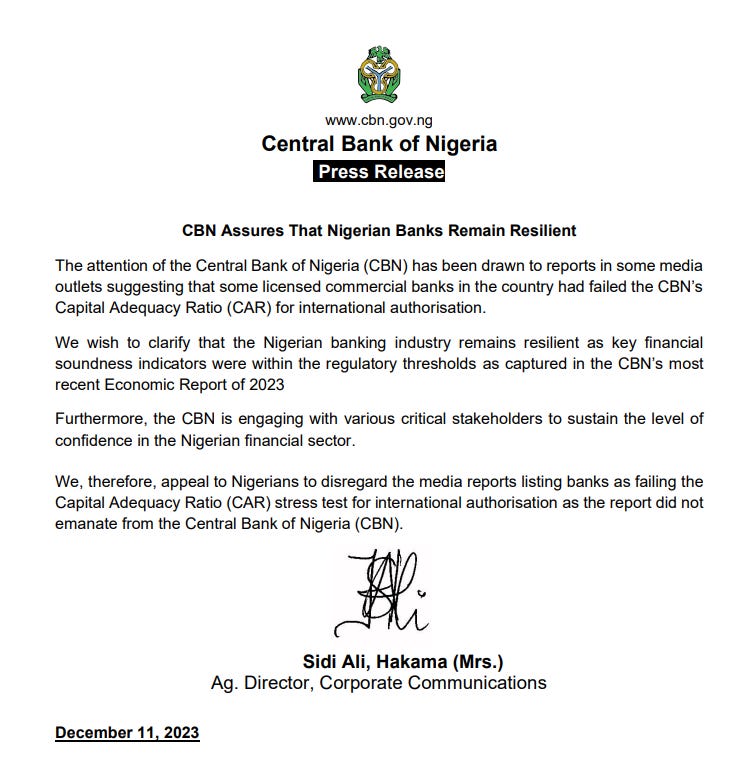SSA Report: The Nigeria Banking Recapitalization Outlook
Don't Sacrifice Who You Could Be, For Who You Are.
Dr. Yemi Cardoso, the Governor of the Central Bank of Nigeria (CBN), has articulated the vision of propelling the Nigerian economy toward a $1 trillion mark by 2025. This ambitious goal is set in conjunction with an impending banking recapitalization, although no specific timeline has been outlined for its implementation.
However, Nigerian Banks have stated the race of recapitalization, with recent action on right issue, public offering, private placement amongst other means before announcement of the exercise by the CBN:
Wema Bank Right Issue of N39.9bn - Link
Fidelity Bank Right Issue - Link
FBN Holdings Right Issue of N139bn - Link
In other for Nigeria to attain a $1 trillion economy, it also needs a financial system with sufficient capital base to ensure that growth can take place.
Banking recapitalization is the act of beefing up the long-term capital of banks to a level set by the CBN to ensure the security of shareholders fund (Equity + Reserves). In 2004/2005, a recapitalization exercise took place to increase the capital base of Nigerian banks from N2bn to N25bn, which led to a reduction of banks from 89 to 24, some of which were merged or completely taken over by larger banks.
Recapitalization is correlated to national development, which involves putting measures in place to sustain and improve the national economy significantly, in this case towards a $1 trillion dollar economy by 2025.
Why The Need for Banking Recapitalization
The banks serve as an agent which facilitate capital and enhances productivity, accepts deposits, creates loans and offer other financial services including foreign exchange, wealth management etc., all crucial to the workings and growth of the economy, as they play the financial intermediary role of linking surplus funds with the deficit unit of the economy.
The primary objective of a sound capital base is to guarantee an efficient banking system, and a solid capital base would enable the banking system to perform its functions in financial intermediary effectively.
Since the resumption to office of the new CBN Governor, the committee has assured the public of the soundness of the Nigerian financial system. The key thing to note is that a banking crisis starts with the bank inability to meet its financial commitments to its stakeholders, such as insufficient capital, increased non-performing loans, illiquidity to meet cash withdrawals or persistent desire to overdraw from the CBN Standing Lending Facility(SLF) window.
The need for a recapitalization also springs up if there are substantial losses, poor corporate governance, inadequate corporate control mechanism, fraud and high staff turnover. Recently, the CBN dissolved the board of certain banks (Union, Providus and Keystone) - Link primarily due to corporate governance issue and breach in regulatory controls. In addition, since the last recapitalization in 2005, there has been a substantial depreciation of the Nigerian Naira in the FX market, as such, an economy with comparative indexing to the United States Dollar, would need to increase its capital base in view of the current floating levels of its exchange rate.
The Position of Nigerian Financial Institutions Now
In 2023, Nigerian Banks have performed excellently with good corporate earnings and performance, coupled with the market friendly reforms from the policy department. Additionally, the Nigerian Banking Index in the stock market has performed remarkably throughout 2023, which is a potential signal of investors confidence in the Nigerian Banking Sector:
However, growing the Nigeria economy is also a function of the number of banks that have the capacity to operate in all states of the federation to fund Agriculture, Manufacturing and other Developmental/Infrastructure projects that also contributes to employment and growth.
It is quite clear that the CBN Governor talks the talk and walks the walk - given recent actions, as such there should be an expected shift in sentiment towards positioning in Banking names that have a strong capital base, asset quality, raising capital and with the ability to meet up with the new capital base to be determined by the CBN.
There is no doubt that a Banking recapitalization exercise will have positive effects on the economy, increasing return on assets, return on equity, positive net profit margin, high capital investment ratio and increased basic earnings per share.
Navigating The Process of Banking Recapitalization and Optimal Positioning
The Banking recapitalization process would take a different turn for different banks, depending on their underlying weakness and challenges such as ineffective corporate governance, persistent illiquidity, unprofitable actions, high operating costs and poor asset base.
The recapitalization process could involve the use of Leverage Recapitalization, Leverage Buy Out, Equity Recapitalization, Capital Infusion, Right Issues, Public Offers on the Capital Market, Private Placement and Mergers & Acquisition.
Furthermore, a vital difference that I expect in the banking recapitalization process is ensuring minimal job loss in staff for banks that are unable to meet up with the minimum required capital base, unlike in 2005 where there was increased lay-offs resulting from mergers & acquisitions and restructuring. As the CBN and the President of Nigeria are aimed towards economic growth/development and reducing unemployment, then there should be a strategic approach towards ensuring minimal negative impact on human resources/capital.









How exactly would the banks "beef up" long term capital?